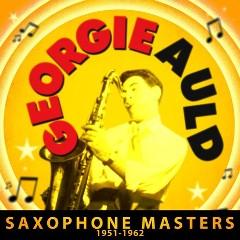Georgie Auld - Saxophone Masters 1951-1962 (2013)
Georgie Auld - Saxophone Masters 1951-1962 (2013)

1 Blue and Sentimental 00:04:19 2 For Losers and Boozers 00:04:13 3 Drinking Again 00:03:24 4 In the Wee Small Hours 00:03:34 5 Here's to the Losers 00:03:49 6 One for My Baby 00:05:01 7 Learnin' the Blues 00:04:38 8 Everything Happens to Me 00:04:04 9 That Old Feeling 00:04:26 10 Out of Nowhere 00:04:47 11 What's New 00:02:56 12 Airmail Special 00:02:59 13 Taps Miller 00:03:27 14 You Are My Lucky Star 00:02:14 15 Seven Come Eleven 00:03:34 16 A Smooth One 00:04:24 17 I'm Shooting High 00:03:18 18 Taking a Chance on Love 00:03:51 19 You're Faded 00:04:38 20 It's a Good Day 00:04:25 21 Flying Home 00:03:43 22 Be My Love 00:02:32 23 You Made Me Love You 00:02:29 24 Soft Winds 00:04:19 25 I Found a Million Dollar Baby in a Five and Ten Cent Store 00:05:46 26 Sweet Lorraine 00:03:46 27 Seh! Seh! 00:02:31 28 The Things We Did Last Summer 00:02:35 29 Rose Room 00:02:46 30 I Found a New Baby 00:04:48 31 On the Alamo 00:02:33 32 Wholly Cats 00:04:15 33 Benny's Bugle 00:03:49 34 Scarecrows 00:02:55 35 Airmail Special (Alternate Take) 00:03:14
John Altwerger, 19 May 1919, Toronto, Ontario, Canada, d. 7 January 1990, Palm Springs, California, USA. Originally an alto saxophonist, Auld found work in the early 30s in New York, where his family had recently moved. In 1936 he switched to tenor saxophone under the influence of Coleman Hawkins and, after leading a small group, joined the big band of Bunny Berigan. In 1939, after two years with Berigan, he was hired by Artie Shaw on the recommendation of Billie Holiday. He persuaded Shaw to recruit Buddy Rich, then, after the Shaw band folded, he worked briefly for Jan Savitt, Benny Goodman and Shaw again, before forming his own modern-sounding big band in 1943. The latter included Serge Chaloff, Erroll Garner, Dizzy Gillespie and Stan Levey. After 1946 Auld worked mostly as leader of bop-orientated small groups but with occasional stints in big bands, including those of Billy Eckstine and Goodman, and he also worked with Count Basie’s 1950 small band. Auld tried his hand at acting (on Broadway), and played in film and television studios, mainly in Los Angeles. Despite suffering from cancer, he toured extensively, and in the 70s proved especially popular in Japan. In 1977 he coached and ghosted for Robert De Niro in the movie New York, New York, in which he also appeared. In the 80s Auld worked only infrequently, visiting Japan and Europe, where he appeared at the 1984 North Sea Jazz Festival. ---Colin Larkin, The Encyclopedia of Popular Music
download (mp3 @192 kbs):
uploaded yandex 4shared mediafire mega solidfiles zalivalka cloudmailru filecloudio oboom
Last Updated (Wednesday, 05 November 2014 17:47)








